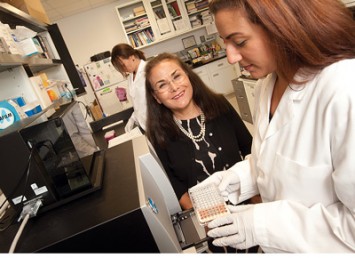Targeting liver disease with gene therapy

Researcher Hayat Onyuksel (center), with doctoral student Fatima Khaja and postdoctoral student Antonina Kuzmis.
Photo: Roberta Dupuis-Devlin/UIC Photo Services
Through its Proof of Concept Gap Funding Initiative, UIC’s Office of Technology Management provides awards of up to $75,000 to UIC researchers who have technology disclosures on file with the university. Four research projects received funding in July and more projects will receive funding this fall.
There’s no treatment for liver fibrosis, a disease that affects 112,000 patients and kills about 29,000 Americans each year. The only option: a liver transplant.
Hayat Onyuksel and her team of researchers are working to change that.
They’re developing a gene therapy that delivers a specific molecule, small interfering RNA (siRNA), to specific cells in the body. Using nanomedicine, researchers can specifically target the gene that carries the disease without affecting healthy genes in the body, said Onyuksel, professor of pharmaceutics and bioengineering.
“There’s a huge promise and impact if it works, and it will be a big evolution in gene therapy,” she said.
“Gene delivery is cutting-edge research — almost every disease is now associated with some type of gene.”
Onyuksel, whose earlier research focused on drug delivery, has expanded her work to gene delivery, a method for introducing foreign DNA into cells.
The idea for the project came from one of Onyuksel’s graduate students, Fatima Khaja.
“We’re still at the very early stage, testing it in vitro,” Onyuksel said.
“Hopefully we’ll get some promising preliminary data on animals. That will be a very important step.”
The technology could eventually be used to treat other diseases, she said.
“If we can see how this is possible with this disease, we can always expand our system to different genes, like cancer or heart disease,” she said. “It will have a huge impact.”
